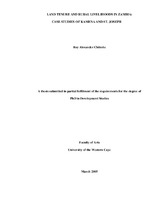Land tenure and rural livelihoods in Zambia: case studies of Kamena and St. Joseph
Abstract
This study explores how land and natural resources in rural communities are accessed, used, and managed in livelihoods. In particular it examines first, crop field tenure, and livelihoods in natural resources. Second it explores factors that mediate access, use and control of land and natural resources within village communities. Empirical data are explored from two rural village communities of Kamena and St. Joseph located in the Northern and Copperbelt provinces of Zambia respectively. The study argues first that land and natural resource rights underpin land based livelihood activities of rural people, the most important of which are subsistence and cash crop farming, and the gathering and processing of common property resources. Second the thesis argues that land tenure reform impacts on the rural population as a whole and not just on cash crop farmers, and should thus situate the needs of farmers for secure tenure within the wider context of diverse rural household livelihood strategies. The study concludes that social differences (along the axes of wealth, gender and descent), traditional institutions (uxorilocal or virilocal marriage, polygamy, inheritance and succession) and government policy are central in determining access, use and control of land and natural resources in rural livelihoods. It is submitted that, rather than being replaced, customary land tenure, and traditional land administration structures in rural Zambia should be adapted to current social and economic realities in which individuals and households create their multiple livelihoods. Further, it is concluded that land tenure reform is not a sufficient condition for rural livelihood sustainability. Thus complementary agrarian measures to address the vulnerability context of rural households are recommended.

